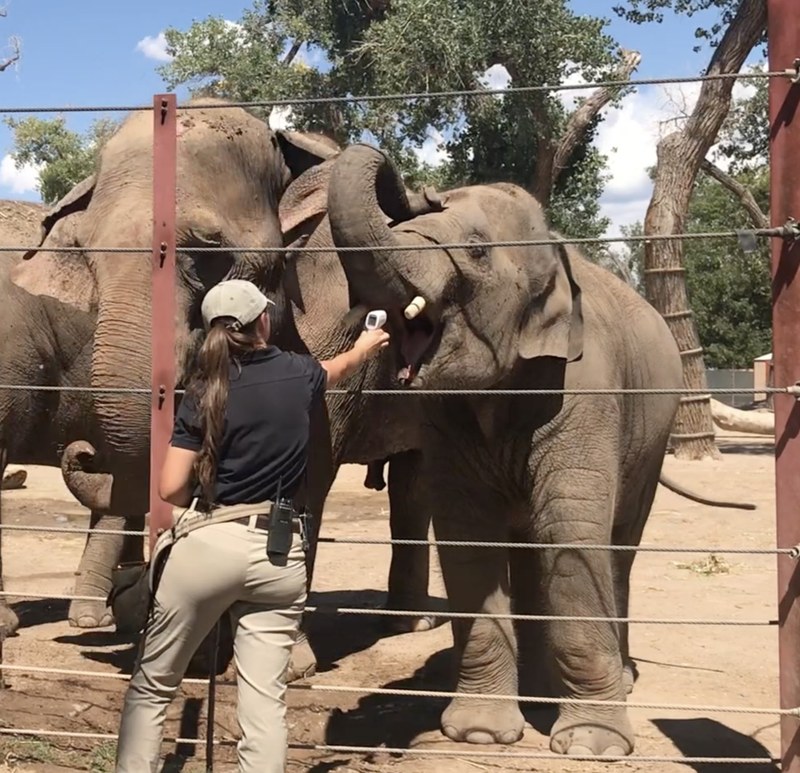
ABQ BioPark Elephant Tests Positive for EEHV
Treatment begun out of an abundance of caution
On Wednesday, December 15, a weekly routine blood tests for Thorn, the BioPark’s 3.5-year-old Asian elephant, came back positive for a very low level of Elephant Endotheliotropic Herpesvirus (EEHV). Out of an abundance of caution, the ABQ BioPark has begun round-the-clock care, including antiviral treatment and observation for symptoms.
At this time, Thorn continues to spend time with the herd and has his choice of being in his outdoor habitat or his more private indoor areas. The BioPark’s animal care team is monitoring his blood values daily.
The virus causes hemorrhagic disease that can be fatal for young elephants. Early detection and rapid treatment are essential for successful recovery from EEHV.
Watch video of Thorn's training
UPDATES:
December 21, 2021
The ABQ BioPark continues to provide around the clock care and treatments for Thorn, our 3 year old elephant who recently tested positive for the Elephant Endotheliotropic Herpesvirus (EEHV). While the most recent daily test results indicate an escalation in the viral load his treatments continue and we remain hopeful and are confident that together we will have the best chance of helping Thorn through this illness.
December 25, 2021
Asian elephant calf dies of elephant endotheliotropic herpesvirus
FREQUENTLY ASKED QUESTIONS:
What is Elephant Endotheliotropic Herpesvirus (EEHV)
EEHV is a herpesvirus that is present in some form in all elephants, both wild and those in human care. It causes hemorrhagic disease that can be fatal in young elephants. There are several strains of the virus.
All elephants can carry the virus in a latent state through their entire lives without negative effects. It is not known why the virus sometimes comes out of latency.
Elephants are most susceptible to the virus from 18 months to 8 years of age. In some cases, the virus load reaches a fatal level within a matter of days. EEHV is the largest single cause of death in Asian elephants in North America.
The virus was first identified in the 1990s. While a lot is still unknown about this virus, the body of knowledge continues to grow thanks to a network of researchers and AZA-accredited zoos. Detection methods have improved, and the best course of action is rapidly applied treatment. Several elephant calves have successfully recovered from EEHV infections in recent years.
Is EEHV related to COVID-19?
No. These viruses are not related.
Have any elephants at the BioPark ever had EEHV?
Yes, the BioPark sadly lost Daizy, a five year old female elephant in 2015 to EEHV.
What does the BioPark do to protect the elephant herd from EEHV?
Knowing that early detection is critical in giving an elephant their best defense against EEHV, the elephant care team at the ABQ BioPark tests blood samples from elephant calves Thorn and Jazmine every week to monitor for the EEHV virus.
All elephants have been trained to be an active member of their own healthcare. They voluntarily let the staff do everything from basic eye and ear exams to complex procedures such as ultrasounds.
Trust is essential, and the care team also trains the adult elephants to calmly observe the calves’ care.
What happened when EEHV was detected in Thorn’s bloodwork?
Knowing how quickly EEHV can impact an elephant, the BioPark’s animal care staff immediately started daily blood tests and antiviral medication. Thorn is being closely monitored for symptoms and changes in behavior.
Is EEHV always fatal?
No, but the animal care professionals at the ABQ BioPark are not taking any chances. Fortunately, over the past few years, the recognition, medical care and treatment of EEHV has improved exponentially. An elephant diagnosed with EEHV has a better chance of survival now than at any point since it was first identified.
How many elephants call the ABQ BioPark home?
The ABQ BioPark is at the forefront of elephant care and leading the way for other facilities with a multi-generational herd of Asian elephants and a unique rotating habitat system.
The herd at the ABQ BioPark consists of grandmother Alice; “Auntie Irene,” who is also the matriarch or leader of the group; mother Rozie; and two offspring, sister Jazmine and brother Thorn. Adult males go off to group-up with other males and find females. Albert is the current resident male and role-model for young three year old Thorn, who will watch him and learn as he grows up.
View information on our elephant program.
FOR MEDIA USE:
Raw b-roll of Thorn training for a blood draw is available at this link.
This was part of a livestream on World Elephant Day in August 2021.
